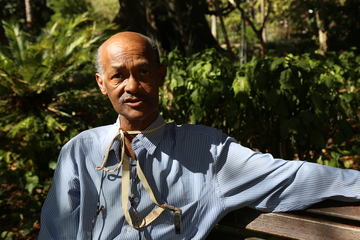Interview with an anti-apartheid activist
 Introduction
Introduction
On 27 April we will celebrate Freedom Day, when we will commemorate our first democratic elections and the birth of democracy in South Africa in 1994.
To truly appreciate the freedom we have, we talked to a former anti-apartheid activist to get a first-hand view of the past, the struggle, and the long fight to achieve democracy for all.
Interview with anti-apartheid activist, Cecyl Esau
Former anti-apartheid activist, Cecyl Esau, was born in 1955 in the quiet Boland town of Worcester. By then, many of the apartheid government’s suppressive laws, such as the Group Areas Act and Bantu Education Act, were in place, freedom of movement was not a right for the majority of the country.
“One of the universals of life is nothing remains the same, everything is subject to change,” the 63 year old says when asked about the old government.
His father, a World War Two veteran who fought against the Nazis, would inspire him to become an activist. “Because my parents were readers, they encouraged reading. So I would go to the library quite often.” During one of his reading sessions, he came across a quote from South African poet and scholar NP van Wyk Louw, “it’s not a shame if a rebellion fails, but it’s a shame if one generation passes without rebellion". “That quote really inspired me,” he says.
Like an athlete continuously training his body, Esau exercised his mind by reading. He would come across stories of successful anti-imperial and anti-colonial activism that took place across Asia and Africa. Rebellions by the Irish against the British inspired him further to take part in anti-apartheid activism.
“If you are dissatisfied with a situation, you must do something to resolve it,” he says. Therefore, becoming an activist against a state that did not even view the majority of its people as citizens was a natural outcome he believes.
The former anti-apartheid activist fondly remembers how nervous he was at his first protest. “I remember my first protest was a civic and youth protest in my hometown, Worcester. We mobilised people against municipal rent increases and other civic issues.”
Some attendees were scared of being stopped by the police. It was against the law during this period for people of colour to move freely in certain areas.
Despite these fears more than 200 protestors arrived and marched to the municipal offices he recalls. The protest got a reaction and the municipal manager was forced to address the crowd.
Esau’s activism saw him travel the province and organising demonstrations during the 1970s and 1980s. He joined the ranks of the United Democratic Front, the African National Congress and worked alongside fellow Worcester born anti-apartheid activist Johnny Issel, who he considers his mentor.
His activism would come to a halt when he was arrested in 1986 for his political activities. He was sentenced to 12 years and sent to Robben Island. During his imprisonment his father passed away. He was denied a chance to attend his father’s funeral. His father’s death began to take its toll on him when he received photographs of the funeral. He realised that he would never share any experiences with his father again.
During a visit to Drakenstein Correctional Centre, then called Victor Verster Prison in 1989 he had the honour of meeting Nelson Mandela.
He was released from prison in 1991 . “It doesn’t matter how long a negative situation lasts, people behave as if that particular injustice will last forever,” he says as he remembered the finals days of apartheid. “Some people believe they will stay in power forever, but life is a dynamic process. Social injustice in the long run will get punished.”
After his release, he took part in the Truth and Reconciliation Commission. He still considers himself an activist but in a different way. His activism today goes hand in hand with his work and research for the Institute for Justice and Reconciliation.
When asked if he believes today’s youth appreciates their freedom, he says he believes this generation appreciates the progress that has been made. “Not every young person today subscribe to a carefree lifestyle,” he says. “You get serious young people.”
He believes we should treasure freedom, because of common humanity. “Everyone alive in the world today belongs to the human family.”
Moving forward together
On Freedom Day, it’s important that we not only enjoy our freedom, but take responsibility to protect our democracy for future generations. As we celebrate 23 years of our democracy, let’s get involved in our communities to make our country and province Better Together.
Celebrate national Freedom Day by enjoying the day with family and friends. Let's not forget the heroic people that fought for our freedom. A freedom where we can:
- Take a boat ride to, and a historical tour of Robben Island.
- Visit any of the Iziko Museums.
- Enjoy the province’s beautiful botanical gardens, like the Kirstenbosch National Botanical Garden or Harold Porter Botanical Garden.
- Go for a hike with the family.
- Have some fun in the sun at one of our 9 blue flag beaches.
We asked the citizens why do they think we celebrate Freedom Day. Watch:


